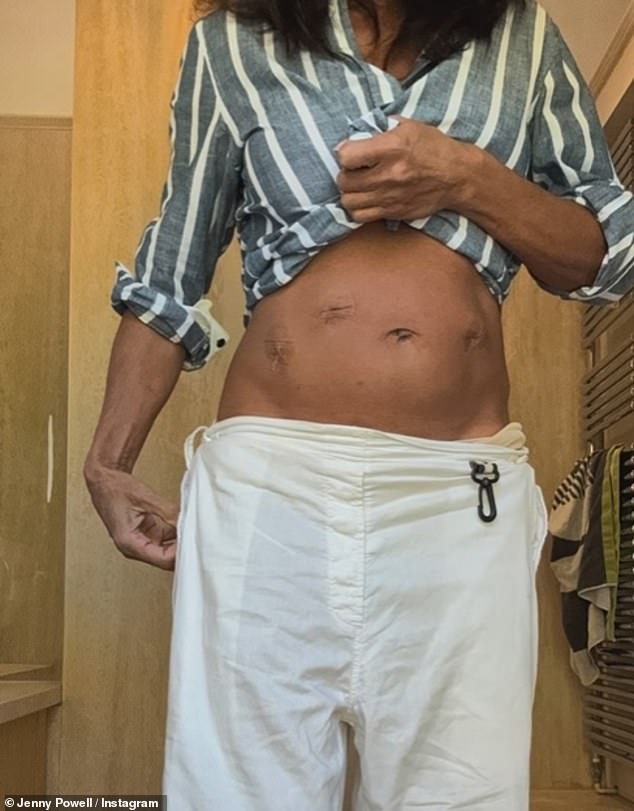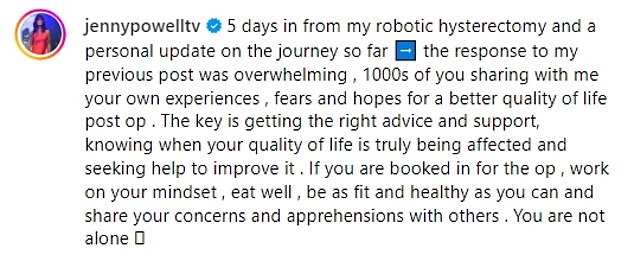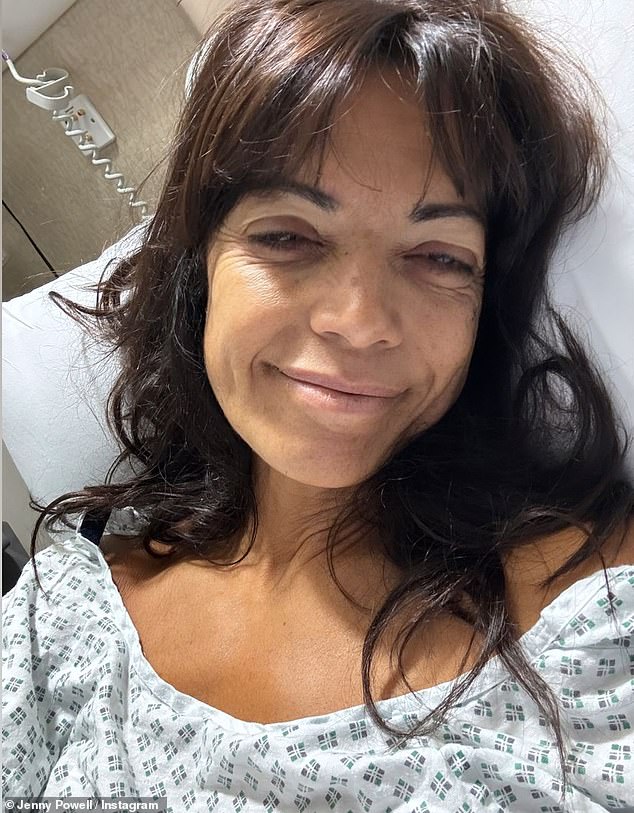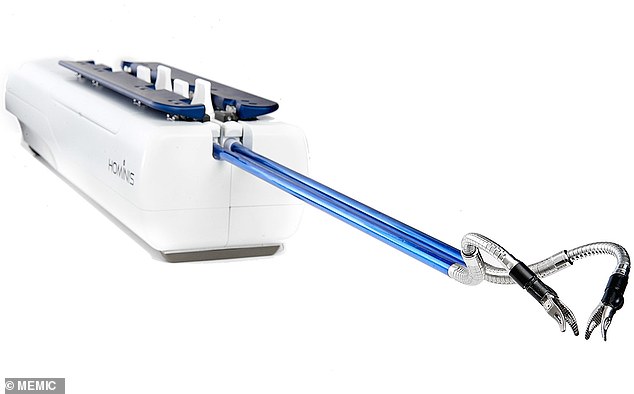Jenny Powell showed off her bruised and scarred stomach after undergoing a robotic hysterectomy while sharing a health update on Instagram on Monday.
The TV presenter, 56, underwent the procedure to relieve her severe menopause symptoms, which she has been incredibly open about.
Documenting her healing progress in a video, Jenny gave fans a rundown of the past few days since the operation last week.
Jenny said: ‘This is literally 36 hours after my robotic hysterectomy. I haven’t taken any painkillers yet and now I have a healing itch in my tummy.’
A couple of days later, Jenny added: “It’s been five days since my robotic hysterectomy and things are going very well with my fears.”
Jenny Powell, 56, showed off her bruised and scarred stomach after undergoing a robotic hysterectomy while sharing a health update on Instagram on Monday.

The TV presenter underwent the procedure to relieve her severe menopause symptoms, which she has been incredibly open about.
“I’ve showered a couple of times and I’m still a little swollen, but it will go away soon, it’s not that bad.”
“Now for aftercare, it’s about not doing too much, but also about keeping moving and not doing too little, so I’m going to start doing some little exercises. I walked well yesterday.”
NHS Trusts rolled out the high-tech remote-controlled machines to clear the backlog of women missing out on vital operations during the Covid pandemic.
While the devices cost just under £2 million each, they reduce the time it takes to perform the delicate surgery and, as they also work with millimeter precision, mean patients recover faster.
Called Hominis, this surgical system is operated by a human controller who maneuvers the robotic arms while watching the procedure on a screen in real time.
The robot features shoulder, elbow and wrist joints to provide human-level dexterity and 360-degree articulation.
An additional arm guides a laparoscopic video camera through a small, separate incision to help visualize the internal procedure.
Hominis enters through the vagina to perform the hysterectomy and then surrounds the uterus with its arms to perform the operation.


Documenting her healing progress in a video, Jenny gave fans a rundown of the past few days since the operation last week.

Shortly after undergoing the operation last week, Jenny explained: “I’ve suffered for a long time with all sorts of symptoms and I’ve tried all sorts, but yeah, it’s about time, hence the hysterectomy.”
Alongside the clip, Jenny wrote: ‘5 days after my robotic hysterectomy and a personal update on the journey so far.
‘The response to my previous post was overwhelming, thousands of you shared with me your own experiences, fears and hopes for a better quality of life after surgery.
‘The key is to get the right advice and support, know when your quality of life is really being affected and seek help to improve it.
‘If you are scheduled for the operation, work on your thinking, eat well, stay as fit and healthy as you can and share your worries and apprehensions with others. You are not alone.’
Shortly after undergoing the operation last week, Jenny explained: “I’ve suffered for a long time with all sorts of symptoms and I’ve tried all sorts, but yeah, it’s about time, hence the hysterectomy.”
‘As I’m menopausal of course things are different, it’s not like this came on early.
‘But I just wonder if there is some connection between this and my emotions. Then it will be interesting. I’m about to put on my fancy dress, so come back later.
Jenny previously revealed she was forced into hospital after severe menopause symptoms left her struggling to “get out of bed every day”.

NHS Trusts rolled out the high-tech remote-controlled machines to clear the backlog of women missing out on vital operations during the Covid pandemic.
The presenter said that she was forced to undergo an iron infusion after suffering anemia due to severe blood loss.
She told Closer magazine: ‘The menopause affected me mentally and I didn’t feel like myself. My periods were horrible, I had to change about five times a day and I lost so much blood that I became anemic. I was really tired and depressed.
“I had a hard time getting out of bed and couldn’t wait to get back to bed at night.”
Jenny spoke candidly about her experience with perimenopause (the time before a woman’s periods stop) and said she didn’t address her symptoms immediately and that her condition worsened because she had left it for so long.
That meant he ended up needing treatment in hospital, adding: “I left it too long to sort it out, so in the end I had to have iron infusions in hospital.”


